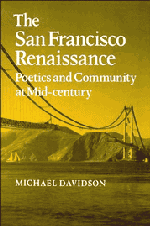Introduction: Enabling Fictions
Published online by Cambridge University Press: 01 June 2011
Summary
INAUGURAL MOMENTS
The limitless and stretching mountains of the damned
Surround Arcadia; they are the hells that rise above the ground
Of this poetic paradise;
(Jack Spicer)The writing of literary history invariably takes mythic forms. A new school, movement, or aesthetic credo often emerges from a series of enabling fictions that structure the reading of a given text. Inaugural moments like the premiere of Stravinsky's Sacre du Printemps, the Armory Show, the arrival of Tristan Tzara in Zurich, and the meeting of Picasso and Braque have become, for better or worse, the luminous centers around which modernism has been formulated. Such moments galvanize public attention and give to the desultory evolution of literary history the illusion of purpose and direction. But these enabling fictions of origin often obscure creative dissension and opposition that are a part of any literary movement.
The history of what has come to be called the San Francisco Renaissance is no exception. What began as a series of loosely organized readings, publications, and meetings has been read as a unified narrative of the literary and artistic life of the San Francisco Bay Area during the late 1950s and early 1960s. This book is a history of that narrative rather than a narrative of that history, the latter having been written already, often through the filter of those myths of origin just mentioned.
- Type
- Chapter
- Information
- The San Francisco RenaissancePoetics and Community at Mid-Century, pp. 1 - 32Publisher: Cambridge University PressPrint publication year: 1989



